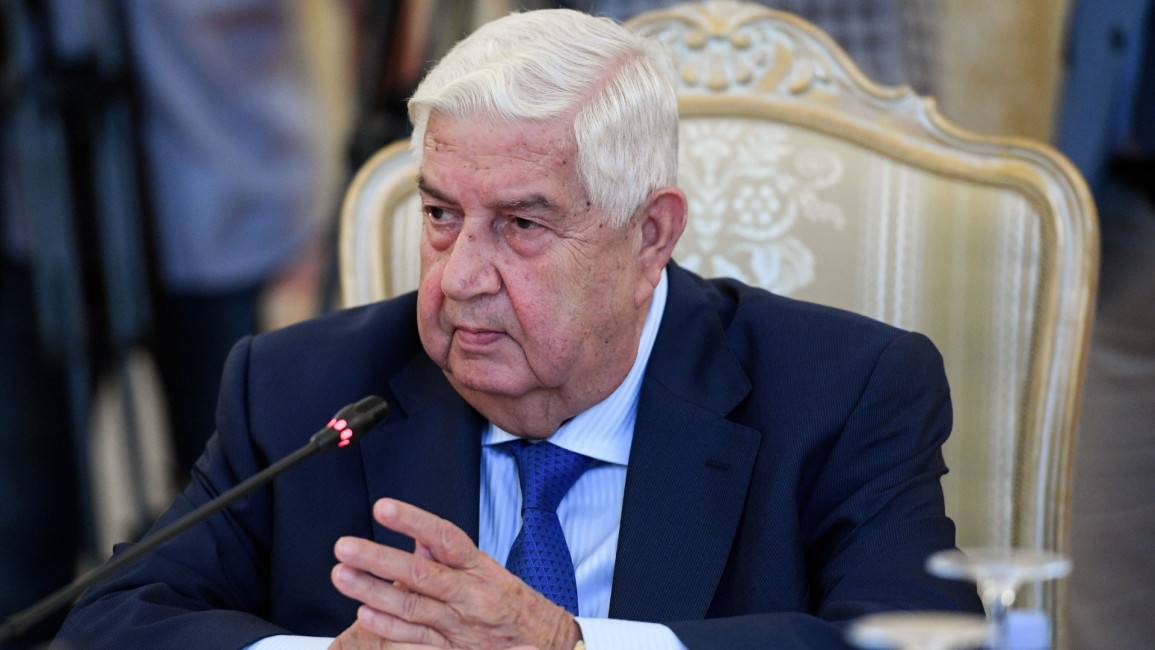
The death of Walid al-Muallem: The legacy of Assad's Goebbelsian foreign minister
It's quite amazing to think Walid al-Muallem, who passed away last Monday aged 79, became the foreign minister of Syria in 2006, the year following the assassination of Rafik Hariri and the consequent Cedar revolution.
Despite these tremors that ought to have served as a warning that regional order wasn't as secure as the tyrants who upheld it imagined, no one know what was on the horizon beyond that.
It was figures such as Walid Muallem that were supposed to be swept away by the tidal wave of change that erupted across the region in 2010 and, specifically, 2011 in Syria, but instead not only did he withstand it, but he was a key part of the brutal counter-revolutionary pushback against it.
In other articles referencing Muallem's death, he is described as a 'stalwart' of the regime of Bashar al-Assad, but he was more than that. Yes, he was as mindless a loyalist to Assad as they come, but the precise nature of his loyalism, given his role as foreign minister during the war, was one of obfuscating and justifying war crimes that could very well amount to genocide.
By the standards of Nuremberg trials, which took place 75 years ago against the remnants of the Nazi regime, Muallem was complicit in the crimes carried out by the Assad regime – if justice should have ever triumphed in Syria, the man who weaved byzantine genocidal conspiracy theories about the Syrian revolution being a Western-Zionist plot, would have found himself in the dock.
Muallem was a lifelong member of the Syrian Regional Branch of the Arab Socialist Baath Party, serving the Baath regime in the 1960s, and a peripherally important supporter of the coup that brought the Assad dynasty to power in 1970.
It's as much a coincidence as it is a testament to the steadfast conservatism of the tyrannical forces in Syria that Muallem's death should come only a few days after the 50th anniversary of Hafez's seizure of power.
 |
As Assad allowed Syria to become occupied by the Iranian regime, Muallem, unlike many of his fellow old school Baathists who feared the Islamic Republic's impact on 'secular' Baathist Syria, had no reservations |  |
Beyong the Baath
But the regime that Muallem first served in various diplomatic roles, including stints as the Syrian ambassador to Saudi, the US as well as part of the negotiating team that sought peace with Israel, was much removed from the one that exists now.
Though Muallem was firmly part of the 'old school' of the Baath Party, he was more ideologically flexible and pragmatic than other members of this wing of the party.
As Assad essentially allowed Syria to become occupied by the Iranian regime to fight the rebellion, Muallem, unlike many of his fellow old school Baathists who feared the Islamic Republic's impact on the 'secular' nature of Baathist Syria, had no reservations about Iran fully hegemonising the Baathist state.
This loyalty not to Syria or even the Baath Party but to Assad is what would ensure that he maintained a high position within the regime.
And no one can read some form of latent sectarianism into Muallem's behaviour, coming as he did from the traditional Baathist base of wealthy, privately educated Sunnis from Damascus.
Regardless of whether it was because Muallem was a true believer in his leader or because of possible personal financial motivations, or even a mix of both, Muallem justified every crime carried out by Assad, Iran and Russia against the Syrian people.
 |
Against the overwhelming evidence of its ruthless brutality, Muallem cast the Assad regime as the besieged victim of US imperialism |  |
Gaslighting
There's little doubt Muallem knew that the uprising was popular and that its pioneers were comprised of a diverse array of normal Syrians, as well as military and civil defectors from the regime familiar to Muallem. But this didn't stop him in his notorious press conferences, during which he would rail against 'the terrorists', whom he claimed were agents of 'Turkey, Qatar and Saudi Arabia', further claiming that the United States was coordinating everything. The motive for this grand conspiracy against Assad? So the US could get to Iran, of course.
Following the Houla massacre, where Assad's sectarian Shabiha militias murdered 108 Sunni Syrians, including 49 children, there was Muallem claiming that the Shabiha didn't even exist. To many, his stern, calm, cold face became synonymous with the calculated bloodlust of the Assad regime.
Whenever the UN would call for restraint from the Assad regime as it unleashed genocidal war on the people of Syria, Muallem would be there to justify the violence by countering that the real aggressors were the foreign forces that 'aid terror' against the regime.
Though his claims were known to be absurd by the majority of the international community, Muallem's target audience was Syrians at home whose loyalties might waver in the face of such violence, as well as fellow travellers in the region and around the world. As well as the Arab tyrannies and Iran and Russia, the authoritarian regimes of Venezuela and Cuba were the only states to issue condolences for his passing.
Against the overwhelming evidence of its ruthless brutality, he cast the Assad regime as the besieged victim of US imperialism. Against the overwhelming evidence of Iranian and, latterly, Russian hegemony over the regime, he cast the rebels as foreign terrorists or at least agents of foreign forces.
But Muallem was savvy enough to also make subtle overtures to the West and its prejudices, with him emphasising the role of al-Qaeda and what would become ISIS. He even, when in New York at the UN General Assembly, compared the rebellion to 9/11.
Moreover, he justified Russia's savage imperialist intervention in the country as a 'game changer' against ISIS, despite knowing full well Putin's targets were rebels and civilians.
While many Syrians, faced with any of the multiple horrors that currently afflict Syria, won't bat an eyelid at Muallem's death, the Syrian journalist Ibrahim Hamidi tells me that his legacy will be considered along partisan lines. The regime and its supporters will portray him as the 'Dean of Arab diplomacy', while the opposition and its supporters will consider him as the 'hardcore of the regime … justifying crimes'.
But objectively speaking there's no doubt that he was more of a propagandist than a diplomat –the US and EU targeted him for sanctions as far back as 2012, due to his leading role in manufacturing justification for regime crimes.
Muallem died before he could ever face justice for his 'soft' yet key role in justifying the crimes of Assad, but his death provides the most stark rebuttal to many of his lies.
As has been reported, and so ironically given the propaganda he spun about Assad fighting against the foreign takeover of Syria, it will be Russia and Iran that select his successor, with the Iranians favouring his deputy Faisal Mekdad and the Russians favouring Assistant Foreign and Expatriates Minister Ayman Sousan.
When the rebels finally collapsed against pro-regime forces in 2017, Muallem often boasted about 'victory'.
Maybe in his final days, Muallem looked around at his country – its populations traumatised, starving and dispersed to the four corners of the earth, its economy on the verge of collapse, its cities destroyed, its sovereignty trampled over by Russia and Iran – and realised that his lies helped achieve this 'victory'. Or maybe he had no such death-bed regrets.
Sam Hamad is an independent Scottish-Egyptian activist and writer.
Join the conversation @The_NewArab
Have questions or comments? Email us at: editorial-english@alaraby.co.uk.
Opinions expressed in this article remain those of the author and do not necessarily represent those of The New Arab, its editorial board or staff.



